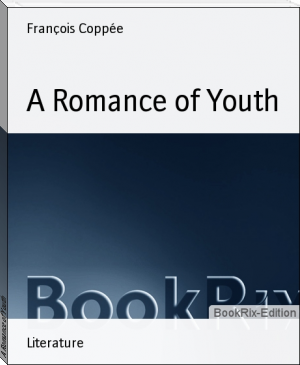International Short Stories: French, - [best ebook reader ubuntu txt] 📗

- Author: -
- Performer: -
Book online «International Short Stories: French, - [best ebook reader ubuntu txt] 📗». Author -
It was to this worthy person that Julie had herself privately conducted. She donned for the occasion all her finery; feathers, laces, ribbons, diamonds, nothing was spared. She wanted to be fascinating; but the real secret of her beauty, in this case, was the whim that was carrying her away. She went up the steep, dark staircase which led to the good lady’s chamber, and, after the most graceful bow, spoke somewhat as follows:
“You have, madame, a nephew, called Croisilles, who loves me and has asked for my hand; I love him too and wish to marry him; but my father, Monsieur Godeau, fermier-général of this town, refuses his consent, because your nephew is not rich. I would not, for the world, give occasion to scandal, nor cause trouble to anybody; I would therefore never think of disposing of myself without the consent of my family. I come to ask you a favor, which I beseech you to grant me. You must come yourself and propose this marriage to my father. I have, thank God, a little fortune which is quite at your disposal; you may take possession, whenever you see fit, of five hundred thousand francs at my notary’s. You will say that this sum belongs to your nephew, which in fact it does. It is not a present that I am making him, it is a debt which I am paying, for I am the cause of the ruin of Croisilles, and it is but just that I should repair it. My father will not easily give in; you will be obliged to insist and you must have a little courage; I, for my part, will not fail. As nobody on earth excepting myself has any right to the sum of which I am speaking to you, nobody will ever know in what way this amount will have passed into your hands. You are not very rich yourself, I know, and you may fear that people will be astonished to see you thus endowing your nephew; but remember that my father does not know you, that you show yourself very little in town, and that, consequently it will be easy for you to pretend that you have just arrived from some journey. This step will doubtless be some exertion to you; you will have to leave your arm-chair and take a little trouble; but you will make two people happy, madame, and if you have ever known love, I hope you will not refuse me.”
The old lady, during this discourse, had been in turn surprised, anxious, touched, and delighted. The last words persuaded her.
“Yes, my child,” she repeated several times, “I know what it is,—I know what it is.”
As she said this she made an effort to rise; her feeble limbs could barely support her; Julie quickly advanced and put out her hand to help her; by an almost involuntary movement they found themselves, in an instant, in each other’s arms.
A treaty was at once concluded; a warm kiss sealed it in advance, and the necessary and confidential consultation followed without further trouble.
All the explanations having been made, the good lady drew from her wardrobe a venerable gown of taffeta, which had been her wedding-dress. This antique piece of property was not less than fifty years old; but not a spot, not a grain of dust had disfigured it; Julie was in ecstasies over it. A coach was sent for, the handsomest in the town. The good lady prepared the speech she was going to make to Monsieur Godeau; Julie tried to teach her how she was to touch the heart of her father, and did not hesitate to confess that love of rank was his vulnerable point.
“If you could imagine,” said she, “a means of flattering this weakness, you will have won our cause.”
The good lady pondered deeply, finished her toilet without Another word, clasped the hands of her future niece, and entered the carriage.
She soon arrived at the Godeau mansion; there, she braced herself up so gallantly for her entrance that she seemed ten years younger. She majestically crossed the drawing-room where Julie’s bouquet had fallen, and when the door of the boudoir opened, said in a firm voice to the lackey who preceded her:
“Announce the dowager Baroness de Croisilles.”
These words settled the happiness of the two lovers. Monsieur Godeau was bewildered by them. Although five hundred thousand francs seemed little to him, he consented to everything, in order to make his daughter a baroness, and such she became;—who would dare contest her title? For my part, I think she had thoroughly earned it.
THE VASE OF CLAY By Jean Aicard I
Jean had inherited from his father a little field close beside the sea. Round this field the branches of the pine trees murmured a response to the plashing of the waves. Beneath the pines the soil was red, and the crimson shade of the earth mingling with the blue waves of the bay gave them a pensive violet hue, most of all in the quiet evening hours dear to reveries and dreams.
In this field grew roses and raspberries. The pretty girls of the neighborhood came to Jean’s home to buy these fruits and flowers, so like their own lips and cheeks. The roses, the lips, and the berries had all the same youth, had all the same beauty.
Jean lived happily beside the sea, at the foot of the hills, beneath an olive tree planted near his door, which in all seasons threw a lance-like blue shadow upon his white wall.
Near the olive tree was a well, the water of which was so cold and pure that the girls of the region, with their cheeks like roses and their lips like raspberries, came thither night and morning with their jugs. Upon their heads, covered with pads, they carried their jugs, round and slender as themselves, supporting them with their beautiful bare arms, raised aloft like living handles.
Jean observed all these things, and admired them, and blessed his life.
As he was only twenty years old, he fondly loved one of the charming girls who drew water from his well, who ate his raspberries and breathed the fragrance of his roses.
He told this younger girl that she was as pure and fresh as the water, as delicious as the raspberries and as sweet as the roses.
Then the young girl smiled.
He told it her again, and she made a face at him.
He sang her the same song, and she married a sailor who carried her far away beyond the sea.
Jean wept bitterly, but he still admired beautiful things, and still blessed his life. Sometimes he thought that the frailty of what is beautiful and the brevity of what is good adds value to the beauty and goodness of all things.
IIOne day he learned by chance that the red earth of his field was an excellent clay. He took a little of it in his hand, moistened it with water from his well, and fashioned a simple vase, while he thought of those beautiful girls who are like the ancient Greek jars, at once round and slender.
The earth in his field was, indeed, excellent clay.
He built himself a potter’s wheel. With his own hands, and with his clay, he built a furnace against the wall of his house, and he set himself to making little pots to hold raspberries.
He became skilful at this work, and all the gardeners round about came to him to provide themselves with these light, porous pots, of a beautiful red hue, round and slender, wherein the raspberries could be heaped without crushing them, and where they slept under the shelter of a green leaf.
The leaf, the pot, the raspberries, these enchanted everybody by their form and color; and the buyers in the city market would have no berries save those which were sold in Jean the potter’s round and slender pots.
Now more than ever the beautiful girls visited Jean’s field.
Now they brought baskets of woven reeds in which they piled the empty pots, red and fresh. But now Jean observed them without desire. His heart was forevermore far away beyond the sea.
Still, as he deepened and broadened the ditch in his field, from which he took the clay, he saw that his pots to hold the raspberries were variously colored, tinted sometimes with rose, sometimes with blue or violet, sometimes with black or green.
These shades of the clay reminded him of the loveliest things which had gladdened his eyes: plants, flowers, ocean, sky.
Then he set himself to choose, in making his vases, shades of clay, which he mingled delicately. And these colors, produced by centuries of alternating lights and shadows, obeyed his will, changed in a moment according to his desire.
Each day he modelled hundreds of these raspberry pots, moulding them upon the wheel which turned like a sun beneath the pressure of his agile foot. The mass of shapeless clay, turning on the center of the disk, under the touch of his finger, suddenly raised itself like the petals of a lily, lengthened, broadened, swelled or shrank, submissive to his will.
The creative potter loved the clay.
IIIAs he still dreamed of the things which he had most admired, his thought, his remembrance, his will, descended into his fingers, where—without his knowing how—they communicated to the clay that mysterious principle of life which the wisest man is unable to define. The humble works of Jean the potter had marvellous graces. In such a curve, in such a tint, he put some memory of youth, or of an opening blossom, or the very color of the weather, and of joy or sorrow.
In his hours of repose he walked with his eyes fixed upon the ground, studying the variations in the color of the soil on the cliffs, on the plains, on the sides of the hills.
And the wish came to him to model a unique vase, a marvellous vase, in which should live through all eternity something of all the fragile beauties which his eyes had gazed upon; something even of all the brief joys which his heart had known, and even a little of his divine sorrows of hope, regret and love.
He was then in the full strength and vigor of manhood.
Yet, that he might the better meditate upon his desire he forsook the well-paid work, which, it is true, had allowed him to lay aside a little hoard. No longer, as of old, his wheel turned from morning until night. He permitted other potters to manufacture raspberry pots by the thousand. The merchants forgot the way to Jean’s field.
The young girls still came there for pleasure, because of the cold water, the roses, and the raspberries; but the ill-cultivated raspberries perished, the rose-vines ran wild, climbed to the tops of the high walls, and offered their dusty blossoms to the travellers on the road.
The water in the well alone remained the same, cold and plenteous, and that sufficed to draw about Jean eternal youth and eternal gaiety.
Only youth had grown mocking for Jean. For him gaiety had now become scoffing.
“Ah, Master Jean! Does not your furnace burn any more? Your wheel, Master Jean, does it scarcely ever turn? When shall we see your amazing pot which will be





Comments (0)